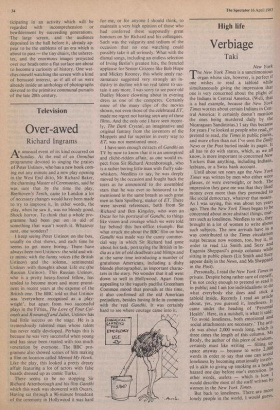Television
Over-awed
Richard Ingrams
A, unusual event of its kind occurred on Sunday. At the end of an Omnibus programme devoted to singing the praises of Peter Ustinov, who has a new book com- ing out any minute and a new play opening in the West End ditto, Mr Richard Baker, the charming Master of Ceremonies, said he was sure that by the time the play, Beethoven's Tenth, came to London a lot of necessary changes would have been made to try to improve it. in other words, the play, when he saw it, was no bloody good. Shock horror. To think that a whole pro- gramme had been put on in aid of something that wasn't worth it. Whatever next, one wonders?
I keep seeing Peter Ustinov on the box, usually on chat shows, and each time he seems to get more boring. There have always been two Ustinovs: the wild and wit- ty mimic with the funny voices (the British Ustinov) and the solemn, sentimental Ustinov with thoughts about Life etc (the Russian Ustinov). This Russian Ustinov, who is a pretty heavy-footed fellow, has tended to become more and more promi- nent in recent years at the expense of the British one. The BBC told us that Ustinov was 'everywhere recognised as a play- wright', but apart from two successful. plays in the Fifties, The Love of Four Col- onels and Roman off and Juliet, Ustinov has had little success on the stage. He is a tremendously talented man whose talent has never really developed. Perhaps this is because he was very successful when young and has since been treated with too much veneration by everyone. The BBC pro- gramme also showed scenes of him making a film on location called Memed My Hawk. Like the play, this looked a pretty dreary affair featuring a lot of actors with false beards dressed up as comic Turks.
There seems to be no stopping Sir Richard Attenborough and his film Gandhi which this week was showered with Oscars. Having sat through a 90-minute broadcast of the ceremony in Hollywood it was hard for me, or for anyone I should think, to maintain a very high opinion of those who had conferred these supposedly great honours on Sir Richard and his colleagues. Such was the vulgarity and tedium of the occasion that no one watching could possibly take it all seriously. What with the dismal songs, including an endless selection of Irving Berlin's greatest hits, the frenzied applause for Senior Citizens like Bob Hope and Mickey Rooney, this whole seedy raz- zamatazz suggested very strongly an in- dustry in decline with no real talent to sus- tain it any more. I was sorry to see poor old Dudley Moore clowning about in evening dress as one of the comperes. Certainly none of the many clips of the movies shown, not even those of the celebrated ET, made me regret not having seen any of these films. And the only one I have seen recent- ly, The Dark Crystal, an imaginative and original fantasy from the inventors of the Muppets and far superior in every way to ET, was not mentioned once.
I have seen enough extracts of Gandhi on TV by now to know that it is an uninspired and cliche-ridden affair, as one would ex- pect from Sir Richard Attenborough, who is a rather boring little man with fluffy side- whiskers. Needless to say, he was deeply moved by the occasion and fought back the tears as he announced to the assembled stars that he was ever so honoured to be mentioned in the same breath as such great men as Sam Spielberg, maker of ET. There were several references, both from Sir Richard and Ben Kingsley, who won an Oscar for his portrayal of Gandhi, to things like vision and courage which we were told lay behind this box-office triumph. But what struck me about the BBC film on how Gandhi was made was the canny commer- cial way in which Sir Richard had gone about his task, portraying the British in In- dia as a lot of old deadbeats and blimps and at the same time introducing a number of gratuitous Americans, including a dishy blonde photographer, as important charac- ters in the story. No wonder that it all went down so well in Hollywood. Apart from appealing to the vaguely pacifist Greenham Common mood that prevails at this time, it also confirmed all the old American prejudices, besides having little in common with the real Gandhi. It was certainly hard to see where courage came into it.










































 Previous page
Previous page